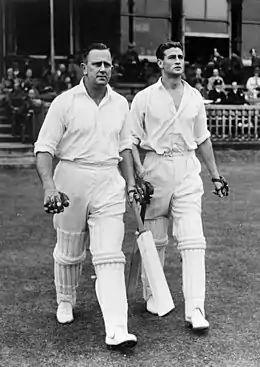Cec Pepper
Cecil George Pepper (15 September 1916 – 22 March 1993) was an Australian first-class cricketer. An allrounder, he was the first to complete the double twice in the Central Lancashire League. He once scored 38 runs off an eight-ball over.[1]
 Pepper (left) walks out to bat with Keith Miller | |||||||||||||||||||||||||||
| Personal information | |||||||||||||||||||||||||||
|---|---|---|---|---|---|---|---|---|---|---|---|---|---|---|---|---|---|---|---|---|---|---|---|---|---|---|---|
| Full name | Cecil George Pepper | ||||||||||||||||||||||||||
| Born | 15 September 1916 Forbes, New South Wales, Australia | ||||||||||||||||||||||||||
| Died | 22 March 1993 (aged 76) Littleborough, Greater Manchester, England | ||||||||||||||||||||||||||
| Batting | Right-handed | ||||||||||||||||||||||||||
| Bowling | Right-arm leg break and googly | ||||||||||||||||||||||||||
| Role | All-rounder, Umpire | ||||||||||||||||||||||||||
| Domestic team information | |||||||||||||||||||||||||||
| Years | Team | ||||||||||||||||||||||||||
| 1938–1941 | New South Wales | ||||||||||||||||||||||||||
| First-class debut | 25 November 1938 New South Wales v Queensland | ||||||||||||||||||||||||||
| Last First-class | 4 September 1957 Commonwealth XI v England XI | ||||||||||||||||||||||||||
| Career statistics | |||||||||||||||||||||||||||
| |||||||||||||||||||||||||||
Source: CricketArchive, 22 January 2009 | |||||||||||||||||||||||||||
Life and career
Cec Pepper played first-class cricket for New South Wales from 1938–39 to 1940–41. He fought in World War II in the Middle East and New Guinea, and at the end of the war he played for Australian Services cricket teams in England (the "Victory Tests" series) in 1945 and in India, Ceylon and Australia in 1945–46.
Career highlights included an innings he played for New South Wales at Brisbane in 1940–41 when he made 81 with all but 7 of them coming in boundaries. His only century came when he hit 168 in 146 minutes, with 17 fours and 6 sixes, for the Australian Services XI against H.D.G. Leveson-Gower's XI at Scarborough in 1945.[2] His best bowling figures of 6 for 33 came in 1949–50 when touring India with a Commonwealth side. He took a hat-trick in the match.[3] He played only two first-class matches after that tour, spending the rest of his career as a professional in league cricket.
Pepper became embroiled in a row that is widely believed to have cost him Test selection. Teammates Keith Miller and Dick Whitington regarded him as one of the best all rounders in the world and a certainty for Australian Test selection. Pepper appealed for leg before wicket against Australian captain Don Bradman in a match against South Australia. The appeal was turned down and Pepper complained to the umpire, prompting Bradman, who was also a member of the Australian Board, to lodge a complaint about Pepper. Pepper was subsequently never selected for Australia.[4] Cricket historian Gideon Haigh said that "[team manager Keith] Johnson was clearly upset by the affair, and also by the failure of the [national] selection panel [Bradman among them] ... to send Pepper, second only to Miller as a cricketer in the Services XI, to New Zealand" in 1945–46.[5] Johnson tried to intercede on Pepper's behalf to no avail, although the other board members claimed that no directive had been given to the selectors to exclude Pepper.[5]
Garry Sobers, who played against him in league cricket, said of Pepper that "the reason why he never played county cricket was probably because of his overripe language. He was certainly good enough as a cricketer but no one wanted to take the chance ... It is said that Sir Don Bradman once remarked that had Cec's mouth and his attitude been different, he would have been one of the greatest all-rounders the world has ever seen."[6]
After retiring he became an umpire in county cricket from 1964 until 1980. He remained in England and died in 1993 in Lancashire. His Wisden obituary noted that "A Manchester Evening News correspondent said he could not imagine any match involving Pepper pursuing a peaceful course", but added that usually "there was more humour than anger".[7]
References
- Cricinfo profile, Cricinfo.
- HDG Leveson-Gower's XI v Australian Services XI 1945
- Holkar v Commonwealth XI 1949–50
- Pollard (1988), p. 372.
- Haigh and Frith, pp. 98–99.
- Garry Sobers, My Autobiography, Headline, London, 2002, p. 50.
- Wisden 1994, p. 1350.
Sources
- Haigh, Gideon; Frith, David (2007) Inside story: unlocking Australian cricket's archives, Southbank, Victoria: News Custom Publishing. ISBN 1-921116-00-5.